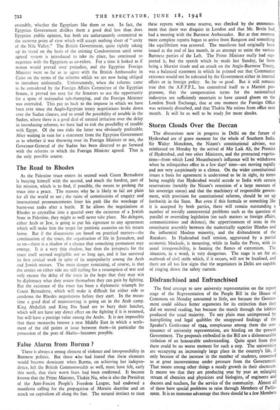The Road to Rhodes
As the Palestine truce enters its second week Count Bernadotte is busying himself with the second, and much the hardest, part of his mission, which is to find, if possible, the means to prolong the truce into a peace. The reasons why he is likely to fail are plain for all the world to see ; the ruins of commissions of enquiry and international pronouncements litter his path like the wreckage of burnt-out tanks after a battle. If he allows the negotiations at Rhodes to crystallise into a quarrel over the existence of a Jewish State in Palestine, they might as well never take place. No delegate, either Arab or Jew, is going to put his signature to any agreement which will make him the target for patriotic assassins on his return home. But if the discussions are based on practical matters—the continuation of the truce, the organisation of life in Jerusalem, and so on—there is a shadow of a chance that something permanent may emerge. It is a very thin shadow, but then the prospects for the truce itself seemed negligible not so long ago, and it has survived its first critical week in spite of its unpopularity among the Arab and Jewish masses. The main danger remaining, of course, is that the armies on either side are still itching for a resumption of war and only excuse the delay of the truce in the hope that they may win by diplomacy what they assure themselves they can gain by fighting. But the existence of the truce has been a diplomatic triumph for Count Bernadotte, which will make it difficult for either side to condemn the Rhodes negotiations before they start. In the mean- time a good deal of manoeuvring is going on in the Arab camp. King Abdullah and King Ibn Saud are to bury their hatchet, which will not have any direct effect on the fighting if it is resumed, but will have a prestige value among the Arabs. It is not impossible that these monarchs foresee a new Middle East in which a settle- ment of the old points at issue between them—in particular the possession of the port of Akaba—becomes possible.


































 Previous page
Previous page